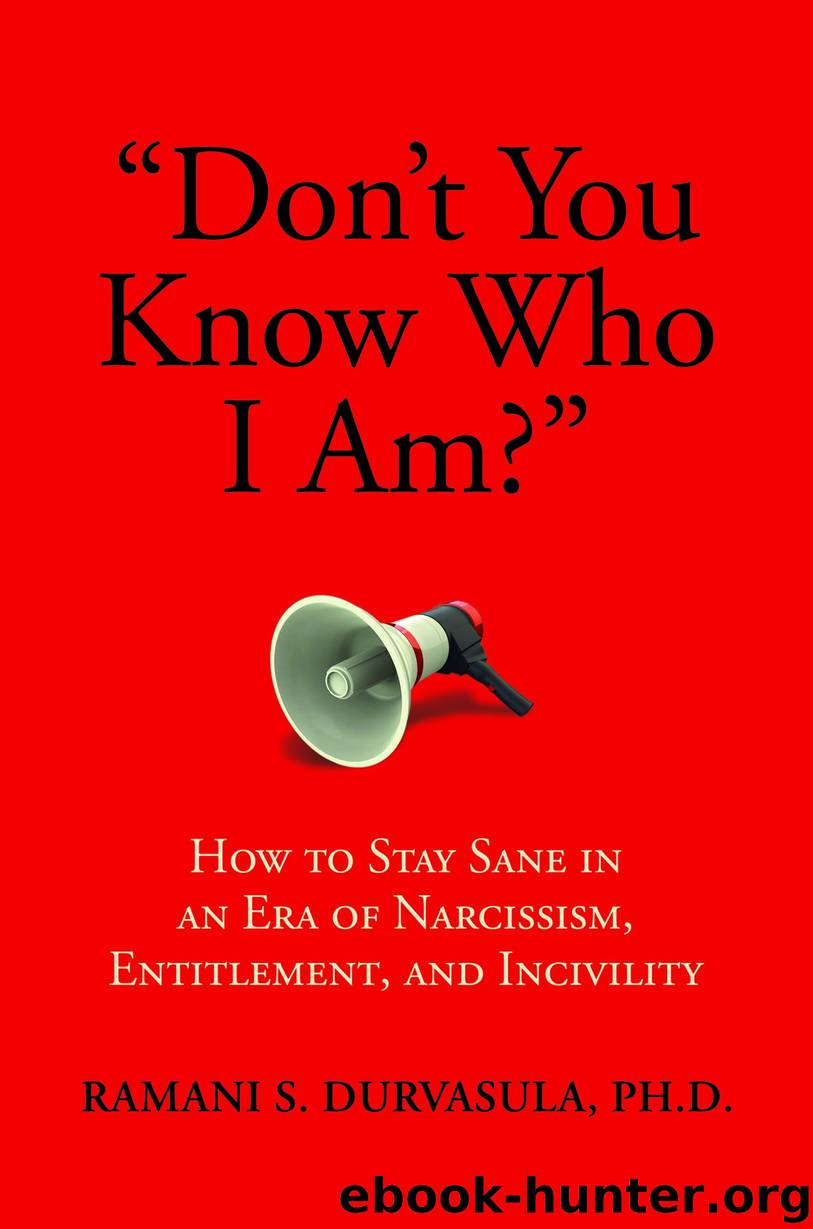Don't You Know Who I Am? by Ramani Durvasula

Author:Ramani Durvasula
Language: eng
Format: epub
Tags: N/A
Publisher: Post Hill Press
Published: 2019-07-29T16:00:00+00:00
Why Do We Stay?
One of the major questions that comes up around entering a narcissistic relationship is “why?” “How could I have fallen for this? Why did I stay in this? It was so clear from the beginning.” Most narcissistic people start their game strong and, as noted earlier, they are overflowing with charm, charisma, and confidence—the three seductive Cs. I maintain my assertion that these traits should leave you very concerned because, in some ways, they are distractors. They can pull you away from digging deeper and understanding the other person or really paying attention to the core qualities that make for a strong relationship, including respect, empathy, compromise, reciprocity, and kindness. In all of my years doing this work, not once did someone, when describing the early months with a narcissistic partner, describe the person as kind, respectful, or warm. The more common adjectives were “fun,” “exciting,” “charming,” “life of the party,” “commanding,” “charismatic,” “good on paper,” “smart.”
Once that early narrative sticks, and they are in the relationship, most people fight to keep the relationship going. This can happen for a variety of reasons, including a sense of duty or responsibility, “stick-to-itiveness,” cultural reasons, financial reasons, routine, simplicity, and pity. However, the most compelling reason may be fear—fear of leaving this relationship but also of then being alone, or of having to start again, or fear that maybe this is as good as it gets. And, since the narcissistic and toxic relationship undercuts any sense of confidence and fills people with self-doubt, they no longer trust their judgment. It becomes easy to think that the problems are “temporary” or perhaps that you are “overreacting,” and it can become quite simple to fall into the trap of “trying harder,” “loving more,” and “making more sacrifices.” A courtship with a narcissist is more of an indoctrination than a love story.
Codependency
There are some who believe that narcissistic relationships remain in place because their partners are “enablers” who participate in the toxic spiral because the narcissist “feeds” their vulnerabilities, while the “codependent” partner keeps providing narcissistic supply. It’s a risky paradigm. Co-dependency is a term that originated in the clinical literature on addiction (and has origins in the language of twelve-step programs, such as Alcoholics Anonymous). It describes a family system characterized by denial, lack of communication, and restricted expression of emotions. Co-dependent individuals often deny their own healthy needs, and attempt to save or rescue the “problematic” person in the family system (e.g., the alcoholic) whether by denial of the problem or by repeatedly rescuing them with caregiving or money and other resources. Definitions of co-dependency have since broadened beyond addiction to other difficult family dynamics, including abuse and other mental illnesses and personality dynamics.
In my experience of working with hundreds of people in this situation, I have observed that being raised in an invalidating family can create the risk of a person’s feeling as though he or she is not enough, and either observed or participated in denial of problems within the family.
Download
This site does not store any files on its server. We only index and link to content provided by other sites. Please contact the content providers to delete copyright contents if any and email us, we'll remove relevant links or contents immediately.
Should I Stay or Should I Go? by Ramani Durvasula(7652)
Why We Sleep: Unlocking the Power of Sleep and Dreams by Matthew Walker(6694)
Fear by Osho(4727)
Flow by Mihaly Csikszentmihalyi(4684)
Rising Strong by Brene Brown(4448)
Why We Sleep by Matthew Walker(4433)
The Hacking of the American Mind by Robert H. Lustig(4369)
How to Change Your Mind by Michael Pollan(4354)
Too Much and Not the Mood by Durga Chew-Bose(4334)
Lost Connections by Johann Hari(4169)
He's Just Not That Into You by Greg Behrendt & Liz Tuccillo(3889)
Evolve Your Brain by Joe Dispenza(3668)
The Courage to Be Disliked by Ichiro Kishimi & Fumitake Koga(3477)
Crazy Is My Superpower by A.J. Mendez Brooks(3394)
In Cold Blood by Truman Capote(3374)
Resisting Happiness by Matthew Kelly(3336)
What If This Were Enough? by Heather Havrilesky(3308)
The Book of Human Emotions by Tiffany Watt Smith(3291)
Descartes' Error by Antonio Damasio(3270)
